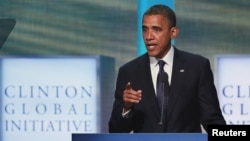UNITED NATIONS —
After his speech to the United Nations General Assembly Tuesday, U.S. President Barack Obama used an appearance at the Clinton Global Initiative to announce new efforts to help crack down on human trafficking.
Calling the fight against human trafficking "one of the great human rights causes of our time," Obama announced new steps to deal with a problem he called "barbaric and evil" with no place in a civilized world.
"It is a debasement of our common humanity. It ought to concern every community, because it tears at our social fabric," said Obama. "It ought to concern every business, because it distorts markets. It ought to concern every nation, because it endangers public health and fuels violence and organized crime. I’m talking about the injustice, the outrage of human trafficking, which must be called by its true name - modern slavery.”
Obama issued an executive order to strengthen what he said is already a strict policy ensuring that government contractors do not engage in forced labor.
"In short, we're making clear that American tax dollars should never, ever, be used to support the trafficking of human beings. We will have zero tolerance; we mean what we say, we will enforce it."
Robinson audio report
Other steps include expanded resources and training for government, state and local law enforcement officials to detect trafficking, and more help for victims who, the president said, "should be treated as victims, not criminals."
A presidential task force will develop a strategic action plan to strengthen services for trafficking victims, with stepped up efforts to monitor trafficking trends in the United States.
In describing the new initiatives, Obama recalled his recent Oval Office meeting with Burmese democracy leader Aung San Suu Kyi, who he noted has been a fierce opponent of forced labor and child soldiers.
"As part of our engagement [with Burma] we will encourage Burma to keep taking steps to reform, because nations must speak with one voice: 'Our people and our children are not for sale.'"
In pledging that the United States will continue to be a leader against human trafficking, Obama made a point of recognizing three women from Congo, Indonesia and the United States who became anti-trafficking advocates.
He also drew a link between the Emancipation Proclamation, the 150-year-old document that proclaimed the freedom of slaves during the U.S. Civil War, two years before slavery was formally outlawed, and the present-day fight against human trafficking.
"The change we seek will not come easy, but we can draw strength from the movements of the past. For we know that every life saved - in the words of that great Proclamation - is "an act of justice," worthy of "the considerate judgment of mankind, and the gracious favor of Almighty God," he said.
Obama said, "there’s no denying the awful reality" that millions of people around the world exist in slavery. To the millions of trafficking victims, he sent this message: "We see you. We hear you. We insist on your dignity."
Calling the fight against human trafficking "one of the great human rights causes of our time," Obama announced new steps to deal with a problem he called "barbaric and evil" with no place in a civilized world.
"It is a debasement of our common humanity. It ought to concern every community, because it tears at our social fabric," said Obama. "It ought to concern every business, because it distorts markets. It ought to concern every nation, because it endangers public health and fuels violence and organized crime. I’m talking about the injustice, the outrage of human trafficking, which must be called by its true name - modern slavery.”
Obama issued an executive order to strengthen what he said is already a strict policy ensuring that government contractors do not engage in forced labor.
"In short, we're making clear that American tax dollars should never, ever, be used to support the trafficking of human beings. We will have zero tolerance; we mean what we say, we will enforce it."
Robinson audio report
Other steps include expanded resources and training for government, state and local law enforcement officials to detect trafficking, and more help for victims who, the president said, "should be treated as victims, not criminals."
A presidential task force will develop a strategic action plan to strengthen services for trafficking victims, with stepped up efforts to monitor trafficking trends in the United States.
In describing the new initiatives, Obama recalled his recent Oval Office meeting with Burmese democracy leader Aung San Suu Kyi, who he noted has been a fierce opponent of forced labor and child soldiers.
"As part of our engagement [with Burma] we will encourage Burma to keep taking steps to reform, because nations must speak with one voice: 'Our people and our children are not for sale.'"
In pledging that the United States will continue to be a leader against human trafficking, Obama made a point of recognizing three women from Congo, Indonesia and the United States who became anti-trafficking advocates.
He also drew a link between the Emancipation Proclamation, the 150-year-old document that proclaimed the freedom of slaves during the U.S. Civil War, two years before slavery was formally outlawed, and the present-day fight against human trafficking.
"The change we seek will not come easy, but we can draw strength from the movements of the past. For we know that every life saved - in the words of that great Proclamation - is "an act of justice," worthy of "the considerate judgment of mankind, and the gracious favor of Almighty God," he said.
Obama said, "there’s no denying the awful reality" that millions of people around the world exist in slavery. To the millions of trafficking victims, he sent this message: "We see you. We hear you. We insist on your dignity."













